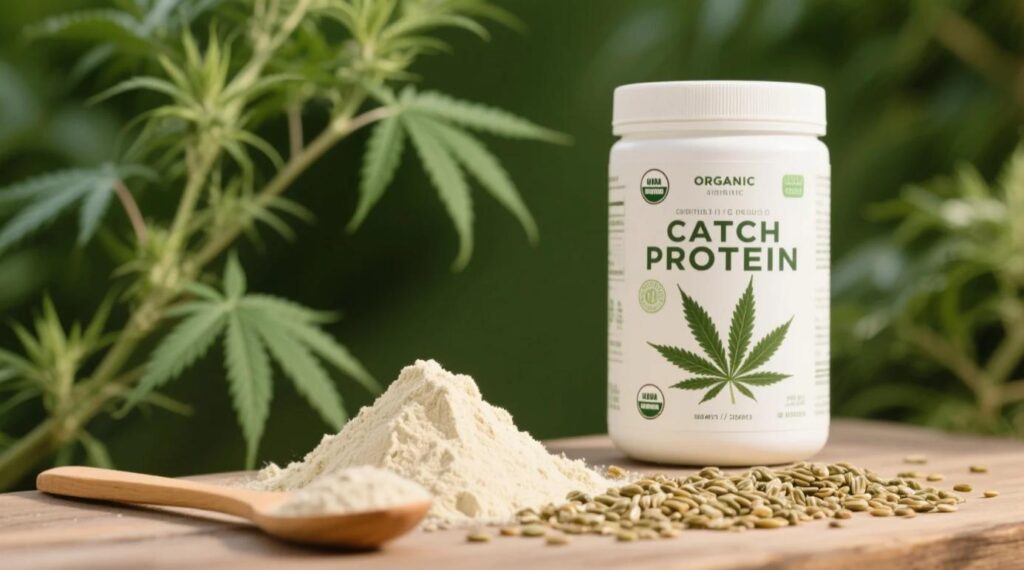Organic hemp seed protein powder has soared in popularity as a plant-based superfood, praised for its sustainability, amino acids, and omega-rich profile. But is it perfect? While its benefits are well-documented, understanding its disadvantages is key to making an informed choice. Let’s explore the lesser-known downsides of hemp protein—and how to navigate them for optimal health.
1. Earthy, Nutty Flavor: Not for Everyone
Hemp protein’s distinct earthy, grassy taste can polarize palates:
- Strong Natural Flavor: Unlike neutral pea or rice protein, hemp’s robust nuttiness may clash with sweet recipes like smoothies or baked goods.
- Texture Challenges: Some brands have a slightly gritty or sandy consistency, even when blended.
Pro Fix: Mask the flavor with bold ingredients like cocoa, cinnamon, or nut butter, or opt for flavored hemp protein blends.
2. Digestive Sensitivity: Fiber Overload?
Hemp seeds are naturally high in fiber (3–4g per serving), which can cause:
- Bloating or Gas: Sudden increases in fiber intake may upset sensitive stomachs.
- Phytic Acid Content: While lower than other seeds, hemp contains phytic acid, which can inhibit mineral absorption if consumed excessively.
Pro Fix: Start with small doses (½ scoop daily) and gradually increase. Pair with probiotic-rich foods (yogurt, kimchi) to ease digestion.
3. Incomplete Protein Myth vs. Reality
Hemp protein contains all 9 essential amino acids, making it technically “complete.” However:
- Low Lysine Levels: While present, lysine (critical for collagen and muscle repair) is in smaller amounts compared to animal proteins or legumes.
- Not Ideal for Muscle-Building Goals Alone: Athletes may need to combine hemp with lysine-rich foods (beans, quinoa) or supplements.
Key Note: For most people, hemp protein suffices, but bodybuilders or those with high protein needs should diversify sources.
4. Trace THC Content: Legal but Worth Noting
Hemp seeds contain trace THC (tetrahydrocannabinol), the psychoactive compound in cannabis. However:
- Legally Compliant: Per U.S. and EU law, hemp-derived products must have <0.3% THC—too minuscule to cause psychoactive effects.
- Sensitivity Concerns: Rarely, some users report mild drowsiness or mood changes, though this is anecdotal.
Pro Fix: Choose brands that provide third-party lab tests confirming non-detectable THC levels.
5. Cost and Availability
- Premium Pricing: Organic hemp protein is often pricier than pea or rice protein due to labor-intensive processing.
- Limited Retail Options: Smaller health stores may not stock it, forcing reliance on online purchases.
6. Environmental Impact: A Double-Edged Sword
While hemp farming is eco-friendly (low water use, carbon-absorbing), its rising demand risks:
- Monoculture Practices: Over-reliance on hemp crops could reduce biodiversity in some regions.
- Greenwashing: Some brands exaggerate sustainability claims without certifications.
Pro Fix: Look for USDA Organic, Fair Trade, or Regenerative Organic Certified labels.
How to Choose High-Quality Hemp Protein
- Cold-Processing: Retains nutrients and minimizes gritty texture.
- Organic Certification: Ensures no pesticides or GMOs.
- Lab-Tested: Confirms low THC and heavy metal levels.
- Additive-Free: Avoid fillers like gums or artificial flavors.
Top Brand Example: Nutiva Organic Hemp Protein (cold-pressed, non-GMO, lab-tested).
Who Should Avoid Hemp Protein?
- Those with Hemp Allergies (rare but possible).
- Individuals on Restricted Diets requiring precise macronutrient ratios.
- Pregnant/Nursing Women: Consult a doctor due to limited studies.
Conclusion: Embrace Hemp Protein—Wisely
Organic hemp seed protein isn’t flawless, but its drawbacks are manageable with mindful consumption. By understanding its earthy flavor, fiber content, and niche limitations, you can harness its benefits—planet-friendly protein, omega fats, and minerals—without compromise.
Ready to Try Hemp Protein?
Opt for a trusted brand, start slow, and pair it with complementary foods. Your body and the Earth will reap the rewards.
? “Nourish consciously. Thrive authentically.” ?
Related Products
Organic Hemp Seeds
Organic hemp seeds offer complete nutrition with optimal protein, fatty acids, and fiber content. Versatile…
Organic Hemp Seed Protein Powder
Available in 70%, 75%, 80% protein levels and customized. All specifications support both conventional and…

